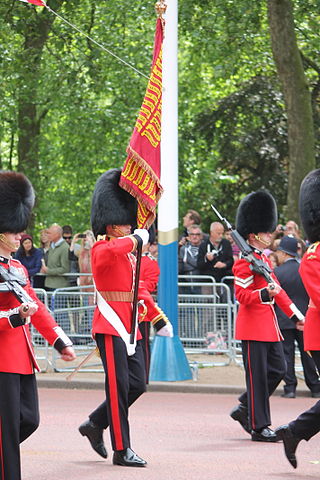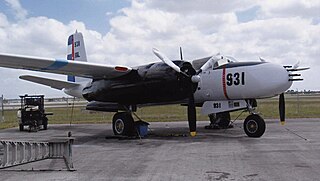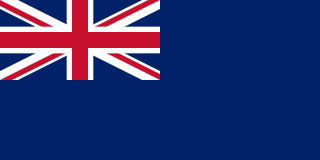
The State Flag of the Union of Soviet Socialist Republics, or simply the Soviet flag, was a red banner with two communist symbols displayed in the canton: a gold hammer and sickle topped off by a red five-point star bordered in gold. The flag's design and symbolism are derived from several sources, but emerged during the Russian Revolution. It has also come to serve as the standard symbol representing communism as a whole, recognized as such in international circles, even after the dissolution of the Soviet Union in 1991.

Ukrainians are an East Slavic ethnic group native to Ukraine. Their native tongue is Ukrainian, and they mostly adhere to the Eastern Orthodox Church. By total population, the Ukrainians form the second-largest Slavic ethnic group after the Russians.
A general officer is an officer of high rank in the armies, and in some nations' air and space forces, marines or naval infantry.

The national flag of Ukraine consists of equally sized horizontal bands of blue and yellow.

The Eye of Providence or All-Seeing Eye is a symbol depicting an eye, often enclosed in a triangle and surrounded by rays of light or a halo, intended to represent Providence, as the eye watches over the workers of mankind. A well-known example of the Eye of Providence appears on the reverse of the Great Seal of the United States, which is depicted on the United States one-dollar bill.

In military organizations, the practice of carrying colours, standards, flags, or guidons, both to act as a rallying point for troops and to mark the location of the commander, is thought to have originated in Ancient Egypt some 5,000 years ago. The Roman Empire also made battle standards reading SPQR a part of their vast armies. It was formalized in the armies of Europe in the High Middle Ages, with standards being emblazoned with the commander's coat of arms.

A false flag operation is an act committed with the intent of disguising the actual source of responsibility and pinning blame on another party. The term "false flag" originated in the 16th century as an expression meaning an intentional misrepresentation of someone's allegiance. The term was famously used to describe a ruse in naval warfare whereby a vessel flew the flag of a neutral or enemy country in order to hide its true identity. The tactic was originally used by pirates and privateers to deceive other ships into allowing them to move closer before attacking them. It later was deemed an acceptable practice during naval warfare according to international maritime laws, provided the attacking vessel displayed its true flag once an attack had begun.

The Ukrainian Navy is the maritime forces of Ukraine and one of the eight service branches of the Armed Forces of Ukraine.

In vexillology, defacement is the addition of a symbol or charge to a flag. For example, the Australian flag is the British Blue Ensign defaced with a Southern Cross in the fly.

A cross pattée, cross patty or Pate, or cross paty, also known as a cross formy or cross formée or Templar cross, is a type of Christian cross with arms that are narrow at the centre, and often flared in a curve or straight line shape, to be broader at the perimeter. The form appears very early in medieval art, for example in a metalwork treasure binding given to Monza Cathedral by Lombard queen Theodelinda, and the 8th-century lower cover of the Lindau Gospels in the Morgan Library. An early English example from the start of the age of heraldry proper is found in the arms of Baron Berkeley.

This is a list of international, national and subnational flags used in Europe.

A naval ensign is an ensign used by naval ships of various countries to denote their nationality. It can be the same or different from a country's civil ensign or state ensign.

The military ranks of the Armed Forces of Ukraine (AFU) were established on March 1992, when Ukraine adopted the Law on Military Duty and Military Service 1992.

The flags of the subdivisions of Ukraine exhibit a wide variety of regional influences and local histories, reflecting different styles and design principles. Most local flags were designed and adopted after Ukrainian independence in 1991.

The national colours of Ukraine are usually identified as the combination of blue and gold in that order. These colours are the same as in the flag of Ukraine. The roots of Ukrainian national colours come from before Christian times when yellow and blue prevailed in traditional ceremonies, reflecting fire and water. The most solid proof of yellow and blue colours could be traced as far as the Battle of Grunwald at which militia formations from various lands of the Polish-Lithuanian Union participated. In maps of the 19th and 20th centuries, the territories of Ukraine were usually coloured yellow. The "gold" (Or) is nearly always represented by a shade of yellow, as there is no distinct colour "yellow" in heraldry; they both count as "Gold". There is a theory that the colors have arrived in the area of present-day Ukraine, together with the governor Prinz Władysław II Opolczyk, who established them to the Principality of Ruthenia on model of his native Upper Silesia.

The white-blue-white flag is a symbol of opposition to the Russian invasion of Ukraine that has been used by Russian anti-war protesters. It has also been used as a symbol of opposition to the current government of Vladimir Putin by several personal Internet accounts, and the Freedom of Russia Legion.

Soviet imagery has been extensively used by Russian forces during the Russo-Ukrainian War, especially following the Russian invasion of Ukraine on 24 February 2022. Prior to its declaration of independence in 1991, Ukraine was a constituent republic of the Soviet Union as the Ukrainian Soviet Socialist Republic.
This is a list article about flags that have been used by pro-Russian separatists in Ukraine and in areas occupied by Russia and Russian-controlled forces during the Russo-Ukrainian War.
This page is based on this
Wikipedia article Text is available under the
CC BY-SA 4.0 license; additional terms may apply.
Images, videos and audio are available under their respective licenses.





































